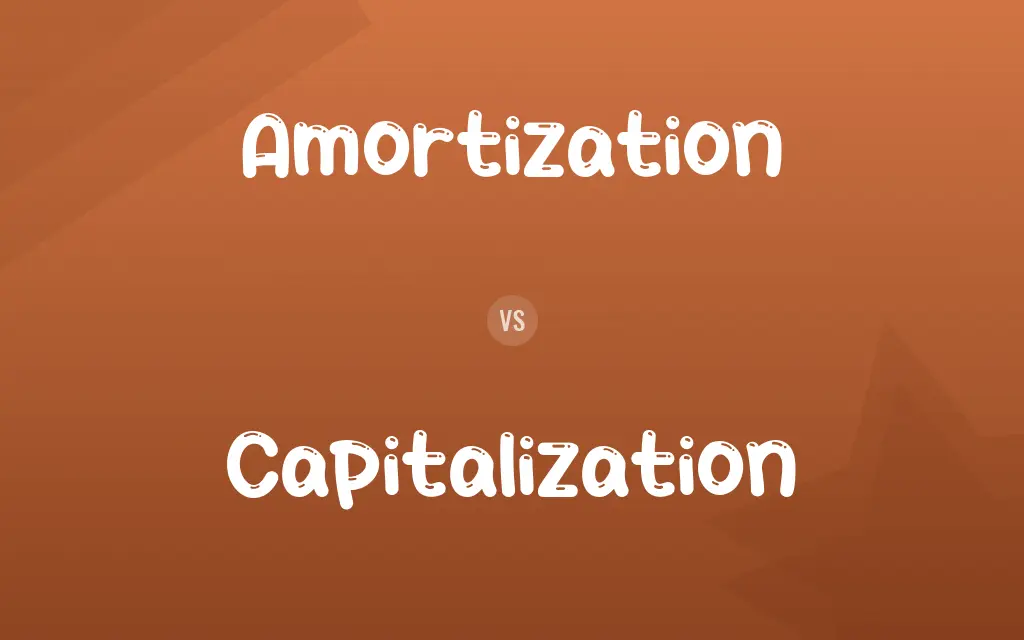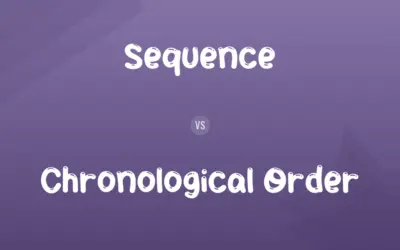Amortization vs. Capitalization: Difference and Comparison
Edited by Muazma Batool — By Muneeza Rehman — Updated on January 27, 2024
Amortization refers to spreading out a loan repayment or intangible asset's cost over time, while capitalization involves recording an expense as an asset on the balance sheet.

Difference Between Amortization and Capitalization
Both amortization and capitalization are essential concepts in finance and accounting, playing pivotal roles in how businesses handle expenses and assets. While they might seem complex, understanding their differences simplifies financial analyses and decisions.
Muneeza Rehman
Jan 24, 2024
Amortization typically refers to the process of paying off debt in regular installments over a period. This can relate to mortgages, loans, or the allocation of the cost of an intangible asset over its useful life. In essence, through amortization, the value of an intangible asset or debt decreases over time. On the contrary, capitalization involves classifying a particular expense not as an immediate cost to be deducted from revenue but as an asset. The rationale behind this is that certain expenditures provide benefits over multiple periods.
Muazma Batool
Jan 24, 2024
When a company buys an intangible asset like a patent, amortization ensures that the cost of this asset is spread across its useful life rather than being accounted for all at once. This ensures accurate representation of the asset's value and its impact on the financial statements. Meanwhile, capitalization primarily concerns tangible assets or expenses that lead to the creation of such assets. For instance, when a business incurs costs in building a new facility, these costs are capitalized, meaning they're added to the value of the asset on the balance sheet.
Muneeza Rehman
Jan 24, 2024
The strategies of amortization and capitalization both aim to match expenses with the revenues they generate. This principle is vital for accuracy in financial reporting. However, while amortization essentially focuses on spreading out the cost, capitalization looks at recognizing the long-term benefit of certain expenses.
William
Jan 24, 2024
Both practices, amortization and capitalization, influence a company's financial statements, though in different ways. Properly distinguishing between the two ensures that assets and liabilities are correctly represented, leading to more informed business decisions.
Jonathan
Jan 24, 2024
Amortization vs. Capitalization Comparison Chart
Definition
Spreading out loan repayments or intangible assets' costs over time.
Recording an expense as an asset on the balance sheet.
Muneeza Rehman
Jan 24, 2024
Effect on Financial Statements
Reduces the value of an asset or liability over time.
Increases the value of an asset.
Muneeza Rehman
Jan 24, 2024
Periodicity
Regularly over the asset's useful life.
Initially, when the expenditure occurs, leading to benefits over multiple periods.
Muneeza Rehman
Jan 24, 2024
Purpose
To match the cost of an asset to the periods it benefits.
To reflect the long-term benefit of certain expenses.
Henry
Jan 24, 2024
Amortization vs. Capitalization Definitions
◉Amortization
Allocation of periodic amounts to decrease an asset or liability.
The company uses straight-line amortization for its intangible assets.
Elijah
Sep 25, 2023
◉Capitalization
Recognizing expenditure as producing future benefits.
Research and development costs were capitalized as they'd provide long-term advantages.
Muazma Batool
Sep 25, 2023
◉Amortization
Spreading an intangible asset's cost over its useful life.
The patent's amortization will occur over ten years.
Elijah
Sep 25, 2023
◉Capitalization
Allocating an expense to the asset category of a balance sheet.
Instead of expensing the equipment, the company chose capitalization.
Lucas
Sep 25, 2023
◉Amortization
The systematic reduction of a loan balance.
Monthly mortgage payments include both interest and amortization of the principal.
Lucas
Sep 25, 2023
◉Capitalization
The total value of all outstanding shares of a company.
The tech giant has a capitalization of over $1 trillion on the stock market.
William
Sep 25, 2023
◉Amortization
Gradual elimination of a liability in regular payments.
Through amortization, her student loan will be paid off in 15 years.
Muneeza Rehman
Sep 25, 2023
◉Capitalization
Increasing the total capital, including debt and equity.
The company raised its total capitalization by issuing more shares.
Muneeza Rehman
Sep 25, 2023
◉Amortization
Recognition of the declining value of an intangible asset.
The goodwill from an acquisition undergoes amortization over a predetermined period.
Muazma Batool
Sep 25, 2023
◉Capitalization
Treating a cost as an investment in an asset.
The costs of constructing the building were capitalized on the balance sheet.
Henry
Sep 25, 2023
◉Amortization
In reckoning the yield of a bond bought at a premium, the periodic subtraction from its current yield of a proportionate share of the premium between the purchase date and the maturity date.
Muneeza Rehman
Sep 24, 2023
◉Capitalization
The amounts and types of long-term financing used by a firm, including common stock, preferred stock, retained earnings, and long-term debt.
Muneeza Rehman
Sep 24, 2023
◉Capitalization
The total par value or stated value of no-par capital stock issues.
Muneeza Rehman
Sep 24, 2023
◉Amortization
The distribution of the cost of an intangible asset, such as an intellectual property right, over the projected useful life of the asset.
Muneeza Rehman
Sep 24, 2023
◉Amortization
The act or right of alienating lands to a corporation, which was considered formerly as transferring them to dead hands, or in mortmain.
Muneeza Rehman
Sep 24, 2023
◉Amortization
The extinction of a debt, usually by means of a sinking fund; also, the money thus paid.
Muneeza Rehman
Sep 24, 2023
◉Amortization
the reduction of the value of an asset by prorating its cost over a period of years
Muneeza Rehman
Sep 24, 2023
◉Amortization
payment of an obligation in a series of installments or transfers
Muneeza Rehman
Sep 24, 2023
Amortization vs. Capitalization Frequently Asked Questions
When is an expense typically capitalized?
An expense is capitalized when it provides a benefit in future periods, like acquiring a long-term asset.
Muneeza Rehman
Jan 24, 2024
What is amortization in finance?
Amortization is the systematic allocation of the cost of an intangible asset over its useful life.
Muneeza Rehman
Jan 24, 2024
How does capitalization work in accounting?
Capitalization involves recognizing an expense as an asset, deferring its recognition as an expense over time.
Muazma Batool
Jan 24, 2024
Are amortization and depreciation the same?
No, while both spread costs over time, amortization pertains to intangible assets and depreciation to tangible assets.
Muneeza Rehman
Jan 24, 2024
How is the amortization amount determined?
It's usually determined by dividing the initial cost of the intangible asset by its expected useful life.
Muneeza Rehman
Jan 24, 2024
Why is amortization important?
Amortization ensures that the cost of intangible assets is matched with the revenue they help generate over time.
Kaitlyn
Jan 24, 2024
Is goodwill subject to amortization?
No, under U.S. GAAP, goodwill is not amortized but is tested annually for impairment.
Muneeza Rehman
Jan 24, 2024
Why do companies prefer capitalization over expensing?
Capitalizing can improve current reported earnings, as the cost is spread over multiple periods instead of being recognized immediately.
Nolan
Jan 24, 2024
Can you capitalize labor costs?
Yes, labor costs directly associated with creating or acquiring an asset can be capitalized.
Muneeza Rehman
Jan 24, 2024
Which has a direct impact on net income: amortization or capitalization?
Amortization reduces net income directly, while capitalization defers the expense, affecting net income when the asset is depreciated or amortized.
Muneeza Rehman
Jan 24, 2024
Content Creators
Written by
Muneeza RehmanAt Comparisons.wiki, Muneeza skillfully navigates the vast sea of information, ensuring clarity and accuracy as the lead content editor. With a keen eye for detail, she curates every comparison to enlighten and engage readers.
Edited by
Muazma BatoolAs a content editor, Muazma Batool is not just a grammar guru but a creative mastermind who breathes life into every word. With an eagle eye for detail and a passion for storytelling, she transforms bland text into engaging content that captivates audiences and drives results.






























